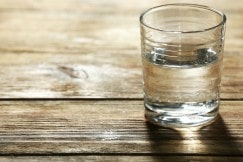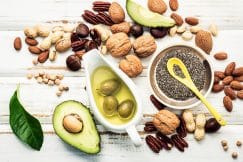We’ve been told by the conventional medical world that too much stomach acid is the cause of reflux and heartburn. In most cases, this actually isn’t correct.
Stomach acid is incredibly beneficial to the body and an increase in stomach acid can actually reduce and many times cure issues like acid reflux or heartburn and improve common issues like irritable bowel syndrome (IBS), leaky gut, colitis, and other gastrointestinal problems.
Let me explain. . .
What Does Stomach Acid Do?
Stomach acid is highly acidic liquid that your body naturally produces to digest your food and it also allows your body to utilize the nutrients in your food. It’s a combination of hydrochloric acid (HCL), pepsin, lipase and other substances and is a necessary part of the digestive process. Stomach acid is also our first line of defense against pathogens, bacteria, parasites, etc.
When the body is relaxed, stomach is released into the stomach and breaks down fats into fatty acids, carbohydrates into glucose, and proteins into amino acids. This breakdown is very important so the body can then use the nutrients in our food.
When the food in your stomach has been mixed with the correct amount of stomach acid, it will reach an acidity of around 2 on the ph scale and then move into the small intestine to continue the digestive process.
Various things that can inhibit stomach acid and raise the alkalinity are stress, eating fast, eating on the go, eating when standing up, drinking alkaline water, chronic elevated cortisol, and anti-acids.
8 Key Things that Happen When There Isn’t Enough Stomach Acid:
- The fats, carbs and proteins cannot break down properly for the body to utilize them. The food will then sit, petrify, become rancid and/or ferment.
- The body can’t absorb or utilize the nutrients in your food such as zinc, iron, magnesium, calcium, Vitamin A, Vitamin D, selenium, etc.
- Overgrowth of harmful bacteria can occur which can lead to ulcers and cancer.
- Because the contents of the stomach aren’t acidic enough, the stomach doesn’t want to release the contents of the stomach into the small intestine (see below).
- When the contents of the stomach reach the small intestine, the gallbladder isn’t signaled to release bile, the pancreas isn’t signaled to release pancreatic enzymes and sodium bicarbonate isn’t released to increase the ph of the digested food.
- Because sodium bicarbonate isn’t released, the mixture of food can burn the mucosal lining which lead can lead to ulcers.
- The proteins that weren’t broken down by proper stomach acid now irritate the villi and can lead to leaky gut. A leaky gut allows fats and proteins to pass through the gut directly into the bloodstream which overwhelms the immune system.
- The undigested food heads to the large intestine and can degenerate and weaken the colon, disrupt the flora, and cause inflammation, IBS and colitis.
If We Need So Much Stomach Acid, Then What Causes Reflux and Heartburn?
When there isn’t enough stomach acid, the pyloric sphincter – the valve that releases the broken-down food into the small intestine – doesn’t want to open. This leads to food sitting in the stomach for much longer than intended. Eventually the food tends to come back up the other way. Ironically, because the food has been bathed in some stomach acid it burns when it comes back up the esophagus.
So, you’re probably asking, “then why do acid-blockers work, or at least take the burn away”? The acid blockers lower the acidity (aka raise the alkalinity) in the stomach. So when the food starts to come back up, it doesn’t burn, but this doesn’t mean the problem is fixed. The acid-blocker is simply masking the symptoms of a bigger issue.
4 Ways to Raise Stomach Acid:
1. Don’t eat when you’re stressed or on the go and eat slowly. This is the most important piece of the puzzle. When you eat slowly and aren’t stressed, your body will be in the parasympathetic state, which is the body’s “rest, digest and heal” function. The parasympathetic state allows your body to release the correct amount of stomach acid, enzymes, etc. to digest your food.
2 .Take 1 tablespoon of apple cider vinegar with a little bit of water before each meal.
OR
3. Take 1 dropper full of digestive bitters before and after each meal.
OR
4. Consider taking HCl with Pepsin or Zypan at each meal. See the directions at the bottom of this article for the dosage. So remember, you need stomach acid! Eat slowly, in a relaxed state and consider some of the remedies I mentioned above – I think you’ll start seeing some great results.






61 Comments